新视野大学英语第二版第一册reading1-7
新视野大学英语第二版第1册读写教程课后习题答案
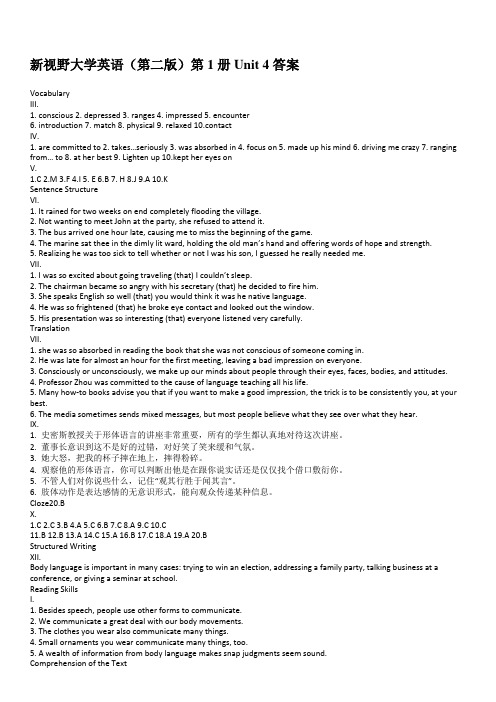
新视野大学英语(第二版)第1册Unit 4答案VocabularyIII.1. conscious2. depressed3. ranges4. impressed5. encounter6. introduction7. match8. physical9. relaxed 10.contactIV.1. are c ommitted to2. takes…seriously3. was absorbed in4. focus on5. made up his mind6. driving me crazy7. ranging from… to8. at her best9. Lighten up 10.kept her eyes onV.1.C2.M3.F4.I5. E6.B7. H8.J9.A 10.KSentence StructureVI.1. It rained for two weeks on end completely flooding the village.2. Not wanting to meet John at the party, she refused to attend it.3. The bus arrived one hour late, causing me to miss the beginning of the game.4. The marine sat thee in the dimly lit ward, holding t he old man’s hand and offering words of hope and strength.5. Realizing he was too sick to tell whether or not I was his son, I guessed he really needed me.VII.1. I was so excited about going traveling (that) I couldn’t sleep.2. The chairman became so angry with his secretary (that) he decided to fire him.3. She speaks English so well (that) you would think it was he native language.4. He was so frightened (that) he broke eye contact and looked out the window.5. His presentation was so interesting (that) everyone listened very carefully.TranslationVII.1. she was so absorbed in reading the book that she was not conscious of someone coming in.2. He was late for almost an hour for the first meeting, leaving a bad impression on everyone.3. Consciously or unconsciously, we make up our minds about people through their eyes, faces, bodies, and attitudes.4. Professor Zhou was committed to the cause of language teaching all his life.5. Many how-to books advise you that if you want to make a good impression, the trick is to be consistently you, at your best.6. The media sometimes sends mixed messages, but most people believe what they see over what they hear.IX.1. 史密斯教授关于形体语言的讲座非常重要,所有的学生都认真地对待这次讲座。
新视野大学英语第二版第一册Unit 1
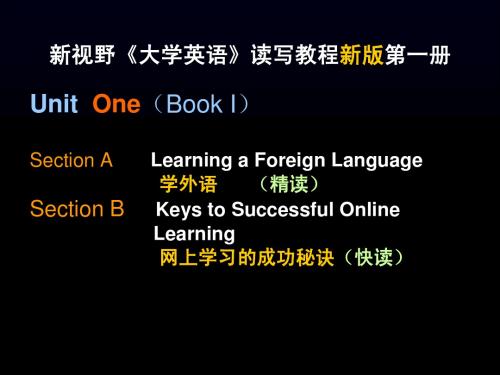
如:--- Only in Wuhan can you eat dry noodle here and there. 只有在武汉你才有可能随处吃到热干面。 只有在武汉你才有可能随处吃到热干面。 --- Not only did we enjoy the film, but we also had a wonderful time. 我们不仅看了电影,而且玩得很痛快。 我们不仅看了电影,而且玩得很痛快。
快速查找来自课文中对应的英文表达: 快速查找来自课文中对应的英文表达:
最有意义的经历
→ most rewarding experience
值得...( 值得...(做)的 ...
→ be well worth sth./ doing sth.
在班里名列前茅
→ be at the top of the class
• • • •
CET- 4 补充 : 下列否定词或短语位于句首时, 句子要倒装。 下列否定词或短语位于句首时, 句子要倒装。 never / seldom / little / nowhere in no way 决不 under no circumstances 决不 no sooner… than 一 … 就 …
4. However, the situation was far from perfect. (Para.4) 一点都不, (be)far from: 一点都不,完全不 ) 听译--如:听译 Far from (being) angry, he's very happy. ) 他一点都不生气, 很快乐。 他一点都不生气 很快乐。 听译--听译 Her husband is far from ( being ) handsome; he is somewhat ugly. 她丈夫谈不上英俊, 有点丑。 她丈夫谈不上英俊 有点丑。
新视野大学英语视听说教程【第二版】第1册第1课

II. Listening Skills: Listening for Names1. Doris: Good morning. Can I help you?David: Yes. I need to change one of my courses.Doris: I’ll see what we can do. What’s your name, please?David: My name’s David Brown.Doris: Your first name again?David: David. D-A-V-I-D.2. Nancy: Excuse me. I want to make sure if I am registered for the new semester of English withDr. Lang.Doris: Just a minute and I’ll check for you. What’s your name, please?Nancy: Nancy Leigh.Doris: Is “Lee” your last name?Nancy: No, it’s Leigh. L-E-I-G-H. But “Lee” would be easier to spell, wouldn’t it?3. Doris: I’m sorry. But if you need a loan, you’ll have to go to the Financial Aid Office beforeyou can register.Nancy: Them who should I see there?Doris: Well, Mrs. Vicky Klein can help you. As a matter of fact, anybody there is very nice. Nancy: Oh, thank you. What is her name again?Doris: Vicky Klein. V-I-C-K-Y, K-L-E-I-N.4. Doris: OK, to complete this form I need your name in full, please.Laura: Laura Tish Hill.Doris: Tish? That’s an unusual middle name. Would you mind spelling that for me?Laura: Sure. T-I-S-H. I was named after my mother.5. Doris: Well, you need to complete the form for your parking pass. Your name, please? Anthony: Anthony McDonald.Doris: Are you “Mc” or “Mac”?Anthony: “Mc”. My family was from Scotland.Doris: OK, Anthony. I’ll have your parking pass ready in a minute.III. Listening InTask 1: EnrollingGood morning, everyone. I’d like to welcome you to City University. I’m Betty Russell and I work in the International Students’ Office. I have some important information for you. First, you must enroll by August 28th. Pick up your ID card at our office. Then, you’ll need to pick up a library card so that you can borrow books from the library. Show them your ID card in the library and they will do it for you. You may be thinking about the sports facilities at our school. There’s no charge for student use, but of course you’ll have to show your ID card. Concerningthe medical assistance, the University has its own health center, and all services are free for enrolled students.Task 2: Living on CampusM: Hi, Lisa. How’s life on campus?W: Hi, John. Oh, not so bad. Pretty good in fact.M: Is that what do you think? I mean, do you like living on campus?W: Ye ah, I enjoy living here because there’s so many people around and it’s easy to make friends.What about you? Have you ever lived in a dorm before?M: No, this is the first time.W: I think you’ll find it quite convenient. The library, labs, sports center a nd other facilities are right on campus.M: That’s true. The atmosphere here is different from the outside. But I guess living in town has its advantages too, like being close to the shopping center. Y ou know, our university is so far from downtown.W: But the commuting to classes…I mean, you would have to get up so early to get to classes on time. And then going home would be so much time.M: Yeah, but the food here…it seems it’s the same thing in the cafeteria every day.W: Well, I think the food here is OK, and if you want a change, you can eat out once in a while. M: True.1.She thinks it’s easy to make friends.2.It’s convenient to use the library, the labs, the sports center and many other facilities.3.It’s near the shopping center.4.They would have to get up so early to get to classes on time. And then it would take a lot oftime to get home.5.It seems all the same every day.Task 3:Which comes first, day or night?There was a student who wanted very much to gain admission to a study course. He was smart enough to get through the written test and appear for the personal interview. Since the boy answered all the questions correctly, the interviewer decided to corner him. "Tell me your choice," said the interviewer to the boy. "I shall either ask you ten easy questions or one really difficult. Which option would you prefer? Think before you make up your mind." The boy thought for a while and said, "My choice is one really difficult question." "Well, you have made your own choice!" said the interviewer. "Tell me: Which comes first, day or night?" The boy was jolted first but he thought for a while and said, "It's the day, sir." "Why?" asked the interviewer. He was smiling. "Sorry, sir, but you promised me that you would only ask me one difficult question!" Admission to the course was thus secured.V. Let’s Talk: School is really hecticMichael: Hi! I saw you yesterday with John. We room together. I’m Michael.Jane: Oh, hi, Mike. How are you doing?Michael: I’m okay, but school has been really hectic since I came. I haven’t even had a chance to breathe!Jane: I know. It’s especially crazy when you’re a freshman. Hey, what’s your major? Michael: Travel and tourism.Jane: Well, what do you plan to do after you graduate?Michael: Uh… I really haven’t decided. I think I’d like to work for a travel agency in this area.What about you?Jane: Well, when I first started college, I majored in physics, but later I realized I might havea hard time finding a job in that field. I ended up changing to computer science. Findinga job in the IT industry shouldn’t be as difficult.Michael: Have you got a part-time job to support yourself through school?Jane: Well, I’m on a four-year scholarship that pays my tuition.Michael: Wow, lucky you!Jane: Yeah. How about you? Are you paying for school yourself?Michael: Sort of. I work weekends at a travel agency.Jane: A travel agency? That seems like a perfect experience for you! What do you do there? Michael: I’m a tour guide. I show tour groups around the city.Jane: Wow, your English must be pretty good then.Michael: Actually, they’re all Chinese tourists. That’s why I got the job!VI. Further Listening and SpeakingTask 1: University LifeUniversity life is a new and different experience for me. First of all, living at the university gives me a sense of responsibility, of being on my own. My parents aren’t around to say, “No, you’re not going out tonight.” I decide everything for myself. Being around lots of friendly people is another aspect I like about university life. On my first day, when I arrived on campus, I was a bit confused about where I was going. An upperclassman noticed me and asked, “Are you a new student?” When he found out I was looking for my dorm, he said, “Oh, just follow me; that’s where I’m going.” Now, I can really say that I feel comfortable in the dorm because there are so many friendly people around to talk with. Finally, I love having Fridays off; I would not be able to deal with five days of classes in a row. How did I do it in high school? I love sleeping in on Fridays. I guess I’m sort of a party animal, but it seems like I go out every Thursday night. It also seems like I don’t get home until early the next day! My head hits the pillow and I don’t move until Friday afternoon.Task 2: Listening EffectivelyThough it is 50% of everyday communication, listening, it seems, is the least taught. Listening ismore than just hearing: it requires understanding. In an educational setting, listening effectively is critical. Effective listening results in doing the right assignment, doing the assignment correctly, and taking notes effectively. Doing these activities well results in learning and, most of the time, good grades. In a professional setting, listening is also critical. When you receive an oral message, your response must be correct. If you fail to listen to customers or clients, you may lose their business, and your job! In a personal setting, listening effectively deepens your relationships. When we listen to someone, we say “You are important” wit hout ever speaking a word. When we fail to listen, not only do we not receive the message, but we send the message that we are just plain dumb.Unit testPart IQuestioin 1M:Hello, there. We've met at the registration office yesterday. If I remember clearly, you are Betsy Adams. You have the same first name as my little sister.W:Yes, I am. I'm so glad to meet you again.Q: What is the man's sister's first name?Questioin 2W:Hey, guys. Here is a letter for Bergkamp. "B-e-r-g-k-a-m-p". Any idea whose letter it is? M:It's mine. "Bergkamp" is my pen name.Q: What is the man's pen name?Questioin 3M:Hello, this is Tony Scott in the Lost and Found Office. What can I do for you?W:Hello. I'm a student in the PE department and I'm calling to check whether someone's found my ID card. My name is Tobey Hayden.Q: What is the woman's full name?Questioin 4W:I've registered for an optional course in French. The teacher gave me a French name "Yvonne". "Y-v-o-n-n-e".M:Wow, It sounds great. You're more international now.Q: What is the woman's French name?Questioin 5M:I heard that there are Chinese twin brothers in our university. Have you met them before?W:You mean the elder Raymond Lee and the younger Allan Lee? To tell you the truth, Allan Lee is in our class. He's a very kind person.Q: What is the elder brother's first name?Part IIW:Hello, John. How do you like your college life? Is everything all right?M:It couldn't be better.W:Oh, really? Tell me something about it.M:Well. It really makes me excited to meet so many friends here.W:So you must have made lots of good friends. Then how's your study?M:I love my major! It's quite interesting and the professors are all great. What about you? W:I'm just fine.Part IIIM:Well, hello! Long time no see!W:Uh, yeah.M:You look great, Helen.W:Oh, thank you, Ned, but I'm Tracy. You're looking good, too.M:Thanks. Oh, and my name is Ben.W:I'm sorry. Are you still working at that... that company?M:Yep, I'm still at the same company. How about you?W:Oh, I'm still a nurse.M:That's great. That's really great. I don't know any nurses.。
新视野大学英语第二版第一册unit1教案

Unit OneSection A Learning a Foreign Language ObjectsStudents will be able to:■understand the main idea and structure of Section A;■learn some devices for developing a paragraph by cause and effect, time & space, comparison and contrast, as illustrated in Section A;■master the key language points and grammatical structures in the text;■conduct a series of reading, listening, speaking and writing activities related to the theme of the unitFocus:■Understanding and using the key words, phrases & expressions, patterns of Section A;■Understanding the main idea and structure of the text;■Mastering the device for developing a paragraph by cause and effect;■Understanding some reading skills---finding out word meanings through context clues, word-formation clues, the knowledge of the subject and the knowledge of the world, ect.Difficulties:■Understanding the structure of the text and the way to develop it;■Mastering the device for developing a paragraph by cause and effect.Time allotment:■1st-2nd period: Leading-in & reading activities■3rd-5th period: Text analysis ( the key language points & structure )■6th-7th period: Writing tasks■8th period: Checking on students’ learning tasks( Exercises in Section A & reading activities of Section B & C )Teaching procesure:Step 1 Leading-inIntroductory remarksEnglish language learning is by no means a piece of cake and at times frustrating.Most of us started to learn English when we were in junior middle school, and some evenearlier in elementary school. We enjoyed the successes and cried at our failures. On the one hand, we may enjoy learning it because it can bring us a lot of benefits. To begin with, it can teach us the value of practice. The more practice we do in listening, speaking, reading and writing, the more progress we make in English. Besides, it can give us insights into other cultures, keeping our mind open to new ways of thinking. And above all, it can help us communicate with many more people than before. On the other hand, we may fell frustrated sometimes because it may be too difficult to do well enough, or may puzzled that our English level stays at the same forever. Like most students of our age, we had to be faced with many problems in learning English, such as pronunciation, grammar rules, and cultural background. And the most frustrating one was how to memorize a large body of new words. As far as the college life is concerned now, however, our big trouble with English learning is that our class is very large and we have few chances to practice our spoken English in class. Now, I’d like to ask you some simple questions to get to know something about your English learning.Warming-up activityShort-answer-Questions1. When and where did you begin to learn English?Tips:—I began to learn English... years ago.—I have learned English for...—My experience with English began in... when...2.Do you enjoy learning English? Why?Tips:—No, I don’t enjoy it because it is useless/too difficult.—Yes, I enjoy it very much. It can help me➢find a good job after graduation.➢learn the cultures of other countries.➢make some foreign friends.➢learn the value of hard work.3. Do you have any trouble learning English? If any, what is it?— I always feel it difficult to...— It’s not easy for me to➢understand what others say.➢remember so many words.➢understand the grammar.➢read quickly.➢speak in public.➢4. What can you do online?Tips:----chatting online----meeting online---shopping online---searching for needed information---learning online ( learning English online)5. What are the advantages of learning English online?Tips:1. equal opportunity to do...2. any place, any time or pace3. cheaper and more convenient4. quicker and easier to get access tomuch information and to teachers5. student-centered6. no limit to the number of studentsStep 2 Reading activitiesIn the following text: Learning a Foreign Language, the author tells us his experience of learning English at different stages. He may share with us some experience of studying English. However, he did make great success in learning English by learning it online!●Reading for general ideaQuestions for thinking about1. What does the writer want to tell us?----His experience of learning English at different stages2. How does he make clear his story?---By cause and effect writing●Reading for some detailsQuestions for discussing1.What made the author’s English learning in junior middle school very successful?The kind and patient teacher and her positive method of praising all students often.2. How was the author’s experience with English learning in senior middle schooldifferent from his experience in junior middle school?In junior middle school, his English teacher was kind and patient. He liked to answer questions in class and he made much progress in English. But, in his senior middle school, his teache r punished those who gave wrong answers. He didn’t want to answer questions any more in class. As a result, he did not make much progress in English.3. In what way is the author’s experience with English in junior middle school similar tohis experience in college? In what way are they different from each other?In college and junior middle school, his English teachers were both patient and kind, but he didn’t have as many chances to answer questions in college as he did in junior middle school.4. Judging from the sixth paragraph, what is basic to online English learning?It requires much time, commitment and discipline to keep up with the flow of the course.5. What was the method the author used for online English learning?Hard work.6. Why didn’t t he author feel intimidated when he found some students could speakfaster than he could?He could take all the time he needed to consider his ideas and write a reply before posting it on the screen.7.Why wouldn’t the author trade his experience in learning a foreign language for anything else?Learning a foreign language taught him the value of hard work and gave him insights into another culture.8. According to the last paragraph, what interests the author most about English?He could communicate with many more people than before.Step 3 Detailed study of the text◆Language points:Words and phrases1. frustrate (L. 2) ( synonym: discourage, disappoint, upset, annoy )v. ①to cause sb. to feel angry or disappointed— Was there anything making you frustrated?—I was frustrated by…②to prevent someone’s plans, efforts from succeedingThe bad weather frustrated all our hopes of going out.2. to be well worth the effort(L. 3)Not everything in life is well worth our risk.3. positive (L. 6)adj.①effective; helpfulDon’t just watch give me some positive advice.②definite; allowing no room for doubtHe was expected to make a positive decision about whether these workers were to be fired.③sure; having no doubt about sth.She was positive that John would help her out of trouble.4. to be at the top of the class(L. 7)On the list of good policies in social contact, honesty should be at the top.5.to lose the desire/eagerness to say anything in English (L.14)As a result of her dishonesty, I lost my desire to form further friendship with her.6.to be far from perfect (L. 19) 远不尽人意Although our environment is still far from perfect, we haven’t lost the desire to change it for the better.7.to stay at the same level forever(L. 26)Sometimes our English learning seems to stay at the same level forever, but, in fact, this is not necessarily the case.8. intimidated (L.24)vt. Make one frightened by threatsThe thieves intimidated the general manager by saying that they world kill him.John intimidated his brother into telling their parents the truth.9.to get access to the necessary equipment(L. 30)Through online learning we get access to many new patterns of thinking.10.to keep up with the flow of the course(L. 33)To keep up with the flow of world trade, China decided to join WTO.11. commitment( L. 33)n. a promise to follow certain beliefs or certain course of actionsHe felt he didn’t have to make such a commitment to Mary.I don’t want to get married because I don’t want any commitments.12. to meet the minimum standards set by the course(L. 34)It also requires commitment and discipline to meet the minimum standards set by the university.13. to cry with frustration(L. 37) 因挫折而哭泣It often happens that while some jump with victory, others sigh with defeat.14. embarrass(L. 37)vt. Make one shy, ashamedIt embarrassed her that her husband was drunk at the dinner.This was an embarrassing situation for the gentleman for he couldn’t afford the dinner.15. to feel like giving up(L. 37)Unlike Zheng Pei-min, some officials only feel like enjoying pleasures as much as possible.16. to reap the benefits of hard work(L. 42) 尝到刻苦学习的甜头Online chatting made it possible for me to reap the benefits of English learning.17. not to trade/exchange/give sth for anything(L. 45) 拿什么都不换What impressed us most in that disaster was their readiness to give their lives for the public health.18. to teach me the value of hard work(L. 45)Much personal contact with him taught me the value of true friendship19. to give me insights into another culture(L. 46) 使我认识了另一种文化Good reading has given me insights into what good taste means.20. to keep my mind open to new ways of seeing things(L. 46) 使我从心里乐于接受新的看待事物的方式As long as we keep our minds open to anything helpful to social progress, our nation will be filled with hope21. to bridge the gap between different cultures(L. 52) 弥合不同文化之间的鸿沟The couple tried to bridge the gap between their emotions, but without any success.Patterns for using as models●Typical patterns for cause and effectBecause of this positive method, I eagerly answered all the questions I could, never worrying much about making mistakes. (L. 6)句型提炼Because of…, sb adv. does sth / is + adj. to do sth, never worrying /caring much about…由于……, 某人很……做某事,从不怎么担心….★Because of her strong desire for material wealth, she was eager to trade her power for★money, never worrying about any damage to larger interests.★Because of his undue interest in online surfing, he is likely to put all his mind on this business, never caring about his school work.●Typical patterns for comparison & contrast1) Now that I speak a foreign language, instead of staring into space when English is being spoken, I can participate and make friends. (L.50)句型提炼Now that sb. does / has done sth., instead of …, he / she can /should do sth. else.由于/既然某人做某事,而不再……, 他/她就能做另一事。
新视野大学英语(第2版)第1册Unit 1答案

Translation(翻译)
VII.
1.(她如此专心地读那本书) she was so absorbed in reading the book that she was not conscious of someone coming in.
2. (他第一次会议就迟到了)He was late for almost an hour for the first meeting, leaving a bad impression on everyone.
6. (既然我们己经学完这门课程)Now that we have finished the course, we shall start doing more revision work.
IX.
1.(I'll never forget) 我永远都不会忘记那位老师,是他告诉我学外语是有趣的、有价值的。如果没有他,我的英语说得不会像现在这样好。
5. (许多指导性的书籍都会)Many how-to books advise you that if you want to make a good impression, the trick is to be consistently you, at your best.
6. (媒体有时会传递含混不清)The media sometimes sends mixed messages, but most people believe what they see over what they hear.
4. (如今,越来越多的人可以)Today, more and more people have access to the Internet through which they look for the information they need.
新视野大学英语读写教程第二版第一册课后练习答案_(1-6)
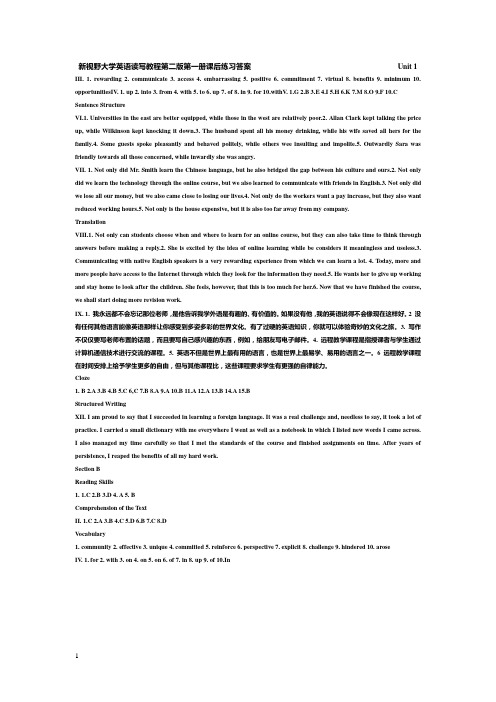
新视野大学英语读写教程第二版第一册课后练习答案Unit 1 III. 1. rewarding 2. communicate 3. access 4. embarrassing 5. positive 6. commitment 7. virtual 8. benefits 9. minimum 10. opportunitiesIV. 1. up 2. into 3. from 4. with 5. to 6. up 7. of 8. in 9. for 10.withV. 1.G 2.B 3.E 4.I 5.H 6.K 7.M 8.O 9.F 10.C Sentence StructureVI.1. Universities in the east are better equipped, while those in the west are relatively poor.2. Allan Clark kept talking the price up, while Wilkinson kept knocking it down.3. The husband spent all his money drinking, while his wife saved all hers for the family.4. Some guests spoke pleasantly and behaved politely, while others wee insulting and impolite.5. Outwardly Sara was friendly towards all those concerned, while inwardly she was angry.VII. 1. Not only did Mr. Smith learn the Chinese language, but he also bridged the gap between his culture and ours.2. Not only did we learn the technology through the online course, but we also learned to communicate with friends in English.3. Not only did we lose all our money, but we also came close to losing our lives.4. Not only do the workers want a pay increase, but they also want reduced working hours.5. Not only is the house expensive, but it is also too far away from my company.TranslationVIII.1. Not only can students choose when and where to learn for an online course, but they can also take time to think through answers before making a reply.2. She is excited by the idea of online learning while be considers it meaningless and useless.3. Communicating with native English speakers is a very rewarding experience from which we can learn a lot. 4. Today, more and more people have access to the Internet through which they look for the information they need.5. He wants her to give up working and stay home to look after the children. She feels, however, that this is too much for her.6. Now that we have finished the course, we shall start doing more revision work.IX. 1. 我永远都不会忘记那位老师,是他告诉我学外语是有趣的、有价值的。
新视野大学英语第二版第一册unit1

Listen to the text:
2. Junior middle school
Junior middle school refers to the stage in the Chinese education system which follows primary school and includes years six through nine in the school time sequence. Normally, students are 12 or 13 years of age when they begin the sixth or transition year of junior middle school. In the American system, junior middle school most closely approximates middle school or junior high school in which the beginning or ending years of this period may vary slightly from region to region. The beginning age is about the same as that of junior middle school students in China.
不同年级大学生的名称:
freshman大一新生 sophomore大二学生 junior大三年级学生 senior大学四年级学生
2. While-reading Activity
1). New Words and Phrases
1. Reward –联系记忆:rewarding 形 容词 值得的,有奖励的
新视野大学英语(第二版)读写教程1网络版答案unit1 (1)-推荐下载
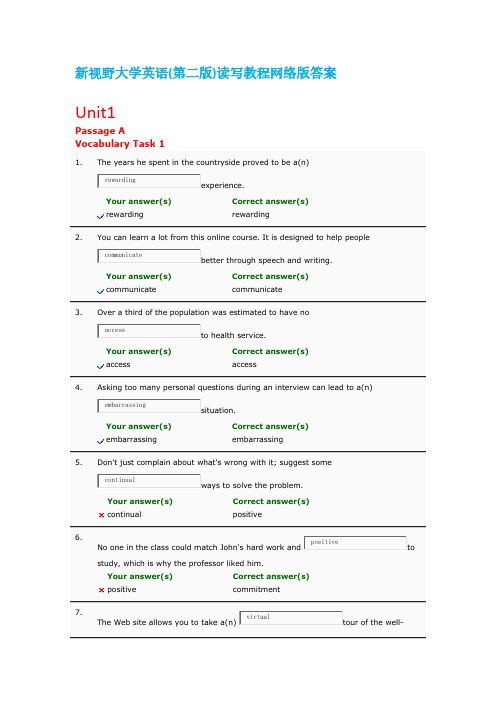
新视野大学英语(第二版)读写教程网络版答案Unit1Passage AYour answer(s)rewardingYour answer(s)communicateYour answer(s)accessYour answer(s)embarrassingYour answer(s)continualYour answer(s)positiveYour answer(s) virtualYour answer(s) benefitsYour answer(s) minimumYour answer(s) opportunitiesYour answer(s) postYour answer(s) gapYour answer(s) favoriteYour answer(s) commitmentYour answer(s) upYour answer(s) intoYour answer(s) fromYour answer(s) withYour answer(s) toYour answer(s) upYour answer(s) ofYour answer(s)inYour answer(s)forYour answer(s)withYour answer(s)ofYour answer(s)likeYour answer(s)forYour answer(s)outBanked ClozeGood communication is the key to success when learning online. You should take the opportunity to get to know your teacher and classmates through email and by participatingexperience.It's true that learning the technology needed to take part in a class can at times beassignment on the Web. But, don't worry! If you have a problem, ask for help. There's nomedium for learning.Online classroom teacher Mike Roberts was asked about what he thought the greatestabout teaching and learning over the Internet. In an ordinary classroom, time is limited, sovaluable ideas with each other in a way that you don't usually see in a regular classroom."Your answers Correct answers1. rewarding rewarding2. frustrating frustrating3. post post4. embarrassed embarrassed5. insights insights6. benefit benefit7. explanation explanation8. minimum minimum9. virtual virtual10. comfortable comfortableClozeI, for one, am far from ready to use online courses for my learning. Don't get methe courses have given us. But for me those opportunities should not be used to replaceI love the classroom. I love having classmates. There are forty students in my class right now, and I think it's great. I even love having classmates who are better than me. And,the hardness of a wooden bench or the heat inside the classroom in early September. Iget excited when I am in the classroom with a good teacher. I learn in a way that hasinto the world.shown me. Their examples make it hard for me to accept a way of learning thatclassroom, that's where I will be learning.Your answers Correct answers1. wrong wrong2. tools tools3. served offered4. not not5. all all6. into into7. special special8. succeed succeed9. positive positive10. go out with reach out to11. through through12. relationship relationship13. access access14. commitment commitment15. does not does notTranslation Task 11.对于网络课程,学生不仅可以选择何时何地学习,在回答问题之前他们还可以有时间思考答案。
《新视野大学英语读写教程(第二版)第一册》-课后答案Unit1-5-9-10

《新视野大学英语读写教程(第二版)第一册》课后答案Unit 1Comprehension of the TextI.1.Because his teacher was kind, patient, and used a positive method of praisingstudents.2.His senior middle school teacher was not as kind as his junior middle schoolteacher. His senior middle school teacher would punish students for makingmistakes. As a result, he did not want to speak English in class and he improved very little3.The differences were that he didn’t have as many opportunities to ask questions incollege as in junior middle school and that other students intimidated him.4. A computer, a phone line, and a modem.5.He practiced, carried a dictionary, and wrote down new words in a notebook.6.Because he could take more time to think more about his answers before postingthem on screen.7.Learning a foreign language taught him the value of hard work. In addition, ittaught him about another culture, opened his mind to new ways of doing things, and allowed him to communicate with more people.8.He likes making new friends and participating when other people are talking inEnglish.VocabularyIII. 1. rewarding 2. communicate 3. access 4.embarrassing 5. positive6. commitment7. virtual8.benefits9. minimum 10. opportunitiesIV. 1. up 2. into 3. from 4. with 5. to 6. up 7. of 8. in 9. for 10.withV. 1.G 2.B 3.E 4.I 5.H 6.K 7.M 8.O 9.F 10.CSentence StructureVI.1. Universities in the east are better equipped, while those in the west are relatively poor.2. Allan Clark kept talking the price up, while Wilkinson kept knocking it down.3. The husband spent all his money drinking, while his wife saved all hers for the family.4. Some guests spoke pleasantly and behaved politely, while others wee insulting and impolite.5. Outwardly Sara was friendly towards all those concerned, while inwardly she was angry.VII.1. Not only did Mr. Smith learn the Chinese language, but he also bridged the gap between his culture and ours.2. Not only did we learn the technology through the online course, but we also learned to communicate with friends in English.3. Not only did we lose all our money, but we also came close to losing our lives.4. Not only do the workers want a pay increase, but they also want reduced working hours.5. Not only is the house expensive, but it is also too far away from my company. TranslationVIII.1. Not only can students choose when and where to learn for an online course, but they can also take time to think through answers before making a reply.2. She is excited by the idea of online learning while he considers it meaningless and useless.3. Communicating with native English speakers is a very rewarding experience from which we can learn a lot.4. Today, more and more people have access to the Internet through which they look for the information they need.5. He wants her to give up working and stay home to look after the children. She feels, however, that this is too much for her.6. Now that we have finished the course, we shall start doing more revision work. IX.1. 我永远都不会忘记那位老师,是他告诉我学外语是有趣的、有价值的。
新视野大学英语读写教程1课后答案
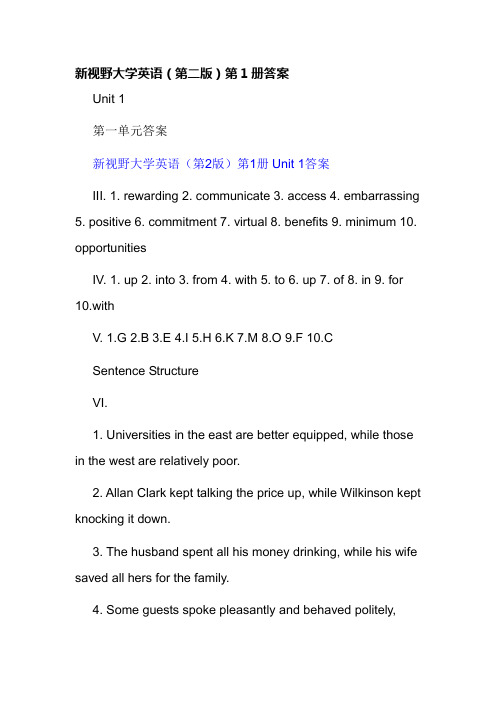
新视野大学英语(第二版)第1册答案Unit 1第一单元答案新视野大学英语(第2版)第1册Unit 1答案III. 1. rewarding 2. communicate 3. access 4. embarrassing 5. positive 6. commitment 7. virtual 8. benefits 9. minimum 10. opportunitiesIV. 1. up 2. into 3. from 4. with 5. to 6. up 7. of 8. in 9. for 10.withV. 1.G 2.B 3.E 4.I 5.H 6.K 7.M 8.O 9.F 10.CSentence StructureVI.1. Universities in the east are better equipped, while those in the west are relatively poor.2. Allan Clark kept talking the price up, while Wilkinson kept knocking it down.3. The husband spent all his money drinking, while his wife saved all hers for the family.4. Some guests spoke pleasantly and behaved politely,while others wee insulting and impolite.5. Outwardly Sara was friendly towards all those concerned, while inwardly she was angry.VII.1. Not only did Mr. Smith learn the Chinese language, but he also bridged the gap between his culture and ours.2. Not only did we learn the technology through the online course, but we also learned to communicate with friends in English.3. Not only did we lose all our money, but we also came close to losing our lives.4. Not only do the workers want a pay increase, but they also want reduced working hours.5. Not only is the house expensive, but it is also too far away from my company.TranslationVIII.1. Not only can students choose when and where to learn for an online course, but they can also take time to think through answers before making a reply.2. She is excited by the idea of online learning while be considers it meaningless and useless.3. Communicating with native English speakers is a very rewarding experience from which we can learn a lot.4. Today, more and more people have access to the Internet through which they look for the information they need.5. He wants her to give up working and stay home to look after the children. She feels, however, that this is too much for her.6. Now that we have finished the course, we shall start doing more revision work.IX.1. 我永远都不会忘记那位老师,是他告诉我学外语是有趣的、有价值的。
新视野大学英语第二版第一册网上学习全详细答案电子书版

ment 2.upset 3.appeal 4.unique 5.embarrassing 6.pierced 7.negative 8.remove 9.awful 10.absolutely
Cloze
1. B 2.B 3.A 4.A 5.A 6.A 7.A 8.B 9.C 10.B 11.A 12.A 13.A 14.C 15.A 16.C 17.B 18.A 19.A 20.C
Vocabulary Task 2
1. to 2. in 3. between 4.about 5. across 6.to 7.to 8.in 9.to 10.for 11. on 12.to 13.away 14.on
Resources
Further Reading 1
1.Y 2.N 3.Y 4.Y 5.NG 6.Y 7.N 8.shared his jokes 9.isn't right for him 10.have a huge problem
新视野大学英语第二版第一册UNIT1网上学习详细答案
Passage A
Vocabulary Task 1
1.rewarding 2. communicate 3. access 4. embarrassing 5. positive 6. commitment 7. virtual 8. benefits 9. minimum 10. Opportunities 11.post 12,gap 13. favorite/favourite 14. continual
2 没有任何其他语言能像英语那样让你感受到多姿多彩的世界文化。有了过硬的英语知识,你就可以体验奇妙的文化之旅。
新视野大学英语第二版第一册Unit1教案
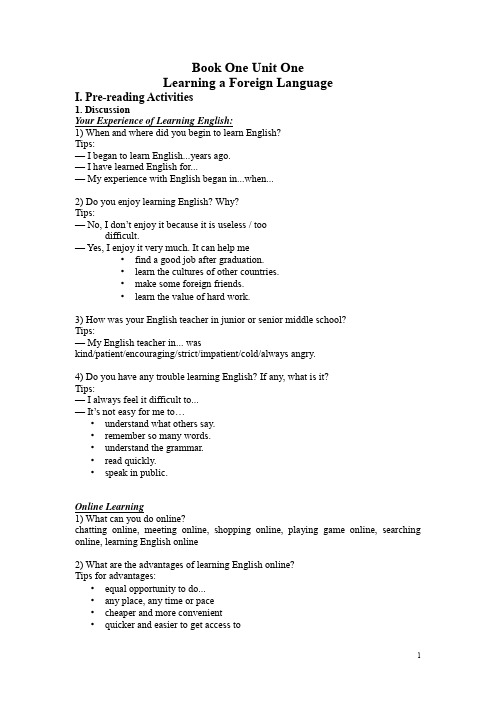
Book One Unit OneLearning a Foreign LanguageI. Pre-reading Activities1. DiscussionYour Experience of Learning English:1) When and where did you begin to learn English?Tips:— I began to learn English...years ago.— I have learned English for...— My experience with English began in...when...2) Do you enjoy learning English? Why?Tips:—No, I don’t enjoy it because it is useless / toodifficult.— Yes, I enjoy it very much. It can help me•find a good job after graduation.•learn the cultures of other countries.•make some foreign friends.•learn the value of hard work.3) How was your English teacher in junior or senior middle school?Tips:— My English teacher in... waskind/patient/encouraging/strict/impatient/cold/always angry.4) Do you have any trouble learning English? If any, what is it?Tips:— I always feel it difficult to...— It’s not easy for me to…•understand what others say.•remember so many words.•understand the grammar.•read quickly.•speak in public.Online Learning1) What can you do online?chatting online, meeting online, shopping online, playing game online, searching online, learning English online2) What are the advantages of learning English online?Tips for advantages:•equal opportunity to do...•any place, any time or pace•cheaper and more convenient•quicker and easier to get access to•much information and to teachers•student-centered•no limit to the number of students...II. Text Study1. Structure AnalysisThe author presents readers with his own language learning experiences at different stages. And at different stages, the author met different teachers and consequently formed different attitudes towards English learning.Now find the information to fill in the blanks.The Topic of Each PartPara(s). Topic1 General experiences of learning a foreignlanguage: difficult yet rewarding.2 Experiences in junior middle school.3 Experiences in senior middle school.4 Experiences at college.5-7 Experiences about online learning.8 Benefits of learning a foreign language.In junior middle school (Para.2):The teacher: kind and patient, positive, often praising the studentsThe author: at the top of my class, eagerly answering all the questions, never worrying much about making mistakesIn senior middle school (Para.3):The teacher: punishing quickly, pointing a long stick at us and shaking it up and down, shouting “No! No! No!”The author: losing my eagerness, losing my joy, losing my desireAt college (Para.4):The teacher: patient and kind, no pointed sticksThe classes: very large, many students spoke much better than I didThe author: feeling intimidated, afraid to speak, staying at the same levelThe on-line learning (Paras.5—7):The on-line learning requires: much time, commitment, disciplineThe author (at the beginning): making many mistakes, crying out of frustration, feeling like giving upThe author (finally): reaping the benefits of all the hard workThe benefits of learning a foreign language(Para.8):1)Teaching me the value of hard work.2)Giving me insights into another culture.3)Enabling me to communicate with more people.The way to develop paragraphs:因果关系法(cause and effect)The cause and effect technique can make clear the reasons why something happens by showing the relation between cause and effect.List the cause and effect of Paras. 2, 3, and 4.Para. 2Cause:The kind and patient teacher often praised the students.Effect:I eagerly answered questions, not worrying about making mistakes. I was at the top of my class.Para. 3Cause:The new teacher quickly punished those who gave wrong answers.Effect:I lost my eagerness to answer questions and my desire to say anything in English. Para. 4Cause:Large classes made me only able to answer a couple of questions in each class period. Many students spoke much better than I did.Effect:I was afraid to speak. My English seemed to stay at the same level.2. Words and Expressions1) reward v.to give sth. in return for goodPhrasesreward sb. with sth.; reward sb. for sth.;e.g.•Larry complimented her and was rewarded with a smile.•She was generously rewarded for her work.reward n.sth. received in return for work or servicesTranslationIn nature there are no rewards or punishments; there are consequences. (British writer, HoraclAnnexley Vachell)Key自然界中没有奖赏和惩罚,只有因果报应。
新视野大学英语第二版第一册第一单元unit1(课堂PPT)
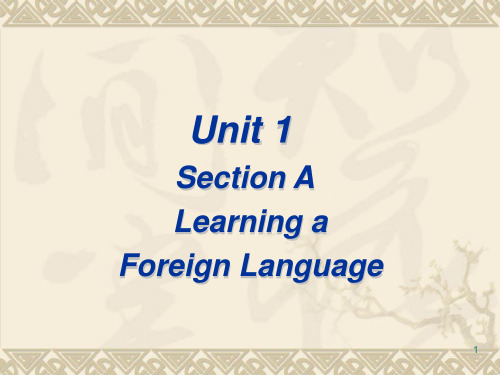
kind/patient/encouraging/strict/impatient/ cold/always angry when I...
6
4. Do you have any trouble learning English? Tips: — I always feel it difficult to... — It’s not easy for me to
3) 3) However, that state didn’t last long. When I went to college. (Para. 4)
4) 4) That was the situation until a couple of years later, when ...participated in the virtual classroom. (Para. 5)
12
Specific statements:
5) Conclusion (Para. 8): a most trying experience, but one that I
would not trade for anything…teach me the value of hard work…give me insights into another culture…my mind …opened to new ways of seeing things…the most wonderful result of having learned a foreign language …communicate with many more people than before…one of my favorite activities…bridge the gap between my culture and theirs
新视野大学英语第二版1答案
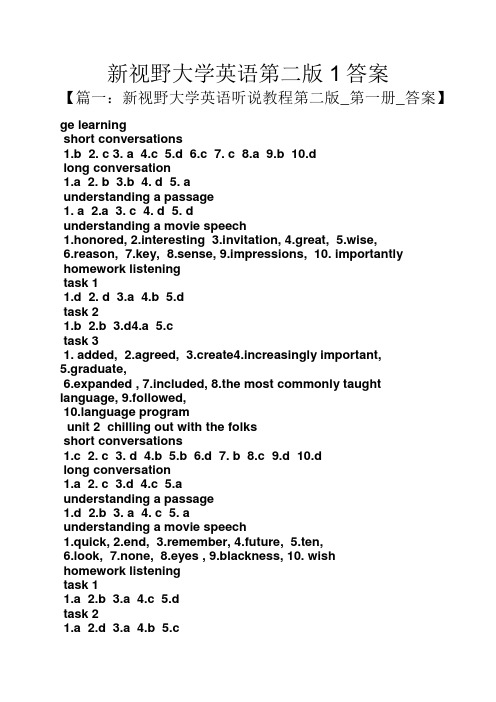
新视野大学英语第二版1答案【篇一:新视野大学英语听说教程第二版_第一册_答案】ge learningshort conversations1.b2. c3. a4.c5.d6.c7. c8.a9.b 10.dlong conversation1.a2. b3.b4. d5. aunderstanding a passage1. a2.a3. c4. d5. dunderstanding a movie speech1.honored,2.interesting3.invitation,4.great,5.wise,6.reason,7.key,8.sense,9.impressions, 10. importantlyhomework listeningtask 11.d2. d3.a4.b5.dtask 21.b2.b3.d4.a5.ctask 31. added,2.agreed,3.create4.increasingly important,5.graduate,6.expanded ,7.included,8.the most commonly taught language,9.followed,nguage programunit 2 chilling out with the folksshort conversations1.c2. c3. d4.b5.b6.d7. b8.c9.d 10.dlong conversation1.a2. c3.d4.c5.aunderstanding a passage1.d2.b3. a4. c5. aunderstanding a movie speech1.quick,2.end,3.remember,4.future,5.ten,6.look,7.none,8.eyes ,9.blackness, 10. wishhomework listeningtask 11.a2.b3.a4.c5.dtask 21.a2.d3.a4.b5.ctask 31. free,2.sales,3.prepare4.needs,5.supplies,unit 3 give and sacrificeshort conversations1.c2. c3. a4.c5.d6.b7. a8.c9.d 10.dlong conversation1.a2. b3.d4.a5.cunderstanding a passage1.b2.c3. a4. c5. bunderstanding a movie speech1.agree ,2.suggestion,3.france ,4.foreigners,5.please,6.fun,7.twice,8.hands,9.happiness, 10. peacehomework listeningtask 11.c2. d3.b4.d5.ctask 21.c2.b3.a4.c5.ctask 31. designed,2.show,3.experiencedanize,5.pilot6.observe,7.expert,8.emergency,9.beating, 10.outdoorunit 4 making a good impressionshort conversations1.d2. b3. b4.a5.c6.b7. a8.d9.b 10.clong conversation1.d2. c3.c4.c5.dunderstanding a passage1.c2.a3. b4. d5. dunderstanding a movie speech1.numbers,2.lead,3.lifetime,4.decides,5.physical,6.back,7.career,8.mysterious,9.love, 10. foundhomework listeningtask 11.b2. d3.a4.c5.ctask 21.d2.c3.b4.a5.btask 31. ruled,2.require,3.equal4.acceptable,5.provides,6.private,7.poor quality,8.needed,9.supported and improved, 10.a majority ofunit 5 the battle against aidsshort conversations1.b2.a3. c4.a5.c6.b7.d8.a9.c 10.clong conversation1.d2.b3.c4.a5.cunderstanding a passage1.a2.c3.c4.d5.ahomework listening:task 1:1.d2.b3.b4.a5.c,task2: 1.c 2.d 3.a 4.c 5.btask3: 1.efforts 2.living 3.central, 4.extended 5.violence,6.appears,7.questioned,8.culturally unacceptable,9.media, 10.entertainmentunit 6 consider collar colors carefully!short conversations1.c2.b3.c4.b5.d6.c7.d8.a9.d 10.dlong conversation1.c2.a3.b4.b5.dunderstanding a passage1.b2.d3.c4.a5.bunderstanding a coving speechstory-telling1)i felt differently, 2)that it made me, 3)though he made, 4)i hurt my back, 5)i usually didhomework listeningtask 1: 1.a 2.b 3.b 4.c 5.btask 2: 1.a 2.b 3.b 4.d 5.ctask 3: 1.political, 2.lower, 3.angry, 4.expected, 5.exporting, 6.economy, 7.praise, 8.seek, 9.resulted from, 10.new opportunitiesunit 7 guns for trouble?short conversations1. b2.c3.c4.d5.c,6.d7.b8.d9. c 10.dlong conversation1.c2.b3.d4.d5.cunderstanding a passage1.d2.c3.c4.a5.cmovie speech1.americans,2.experience,3.back,4.color,5.situation,6.promise,7.first,8.step,9.behind, 10.togetherhomework listeningtask 11.c2.b3.d4.b5.ctask 2 1.a 2.c 3.b 4.d 5.ctask 3 1.threat, 2.native,3.appeared, 4.air,5.powerful,6.including,7.taste,ter,9.fear 10.surviveunit 8 rack your brain for creativityshort conversations1.a2.b3.d4.d5.b6.a7.b8.b9.c 10.cunderstanding a passage1.c2.b3.a4.a5. dunderstanding a movie speech1.join,2.battle,3.meaning,4.differences,5.united,6.fate,7.freedom,8.exist,9.declared, 10.celebratehomework listeningtask 1 1.b 2.d 3.a 4.c 5. atask 2: 1.b 2.d 3.a 4.b 5.btask 3: 1.honors, 2.record, 3.entered, 4.mathematics,5.invited,6.creativity,7.faster,8.advance,9.75,000, 10.excellentunit 9 school daysshort conversations :1.d2.d3.b4.a5.a6.c7.d8.b9.c 10.aunderstanding a passage:1.a2.b3.b4.a5.cunderstanding a movie speech:1.faint,2.sick,3.afraid,4.intention,5.supporting,6.relieved,7.stupid,8.cared,9.smarter, 10.actionshomework listening :task 1: 1.c 2.d 3.d 4.a 5.b ,task 2: 1.a 2.c 3.c 4.b 5.b【篇二:新视野大学英语(第二版)第一册课后习题答案】/p> 课后练习答案目录第一册 (1)目录第一册 (2)第一册 (3)新视野大学英语(第二版)第一册unit 1 (3)新视野大学英语(第二版)第一册unit 2 (4)新视野大学英语(第二版)第一册unit 3 (6)新视野大学英语(第二版)第一册unit 4 (8)新视野大学英语(第二版)第一册unit 5 (9)新视野大学英语(第二版)第一册unit 6 (11)新视野大学英语(第二版)第一册unit 7 (12)新视野大学英语(第二版)第一册unit 8 (14)新视野大学英语(第二版)第一册unit 9 (16)新视野大学英语(第二版)第一册unit 10 (18)第一册新视野大学英语(第二版)第一册unit 1iii. 1. rewarding 2. communicate 3. access 4. embarrassing 5. positive 6. commitment 7. virtual 8. benefits 9. minimum 10. opportunitiesiv. 1. up 2. into 3. from 4. with 5. to 6. up 7. of 8. in 9. for10.withv. 1.g 2.b 3.e 4.i 5.h 6.k 7.m 8.o 9.f 10.csentence structurevi.1. universities in the east are better equipped, while those in the west are relatively poor.2. allan clark kept talking the price up, while wilkinson kept knocking it down.e his wife saved all hers for the family.4. some guests spoke pleasantly and behaved politely, while others wee insulting and impolite.5. outwardly sara was friendly towards all those concerned, while inwardly she was angry.vii.1. not only did mr. smith learn the chinese language, but he also bridged the gapbetween his culture and ours.2. not only did we learn the technology through the online course, but we also learned to communicate with friends in english.3. not only did we lose all our money, but we also came close to losing our lives.4. not only do the workers want a pay increase, but they also want reduced working hours.5. not only is the house expensive, but it is also too far away from my company.translationviii.1. not only can students choose when and where to learn for an online course, but they can also take time to think through answers before making a reply.2. she is excited by the idea of online learning while be considers it meaningless and useless.3. communicating with native english speakers is a very rewarding experience from which we can learn a lot.4. today, more and more people have access to the internet through which they look for the information they need.5. he wants her to give up working and stay home to look after the children. she feels, however, that this is too much for her.6. now that we have finished the course, we shall start doing more revision work. ix.1. 我永远都不会忘记那位老师,是他告诉我学外语是有趣的、有价值的。
新视野大学英语第二版第一册reading1-5

Part 1 Understanding Long Conversations(每小题:2 分)Directions: In this section you'll hear a long conversation or conversations. Listen carefully and choose the best answer to the questions you hear.Questions 1 to 5 are based on the same passage or dialog.1.A. 14.B. 12.C. 20.D. 17.2.A. He trains people who work for UNICEF.B. He hands out books about AIDS prevention.C. He teaches groups of other kids about AIDS.D. He asks people to give money for AIDS patients.3.A. AIDS is so serious that it can lead to immediate death.B. AIDS is not something that should be taught to children.C. AIDS is a problem that young people should learn moreabout.D. AIDS is a problem for adults, but not for children.4.A. By listening to adults.B. By having group discussion.C. By visiting AIDS patients.D. By watching videos on AIDS.5.A. He earns a lot of money by working for UNICEF.B. He thinks singing is the best way of AIDS education.C. He thinks it is not easy to teach his peers about AIDS.D. He takes great pride in working as a peer educator.Part 2 Understanding Passages(每小题:2 分)Directions: In this section you'll hear a passage or passages. Listen carefully and choose the best answer to the questions you hear.Questions 1 to 5 are based on the same passage or dialog. 1.A. At 3:30 every Saturday afternoon.B. At 3:30 every Sunday afternoon.C. At 8:30 every Saturday evening.D. At 8:30 every Sunday evening.2.A. Sharing with My Best Friend.B. Getting with My Best Friend.C. Chatting with My Best Friend.D. Meeting with My Best Friend.3.A. Reading letters from young listeners.B. Giving suggestions to young people.C. Discussing personal issues such as sex and HIV.D. Playing music as a way to teach young people about love.4.A. He's become brave enough to ask teachers questions.B. He's become more mature in making friends.C. He's become more sociable.D. He's become more knowledgeable.5.A. Students can write letters to the program.B. Students can listen and discuss questions together.C. Students can host the program as club members.D. Students can talk to the host of the program freely.Questions 6 to 10 are based on the same passage or dialog. 6.A. His parents were infected with HIV.B. He was infected with HIV.C. He got AIDS from his parents.D. His parents died of AIDS.7.A. 15% of the population.B. 20% of the population.C. 5% of the population.D. 25% of the population.8.A. Group talks, lectures and plays.B. Group talks, Pop concerts and lectures.C. Group talks, sports and plays.D. Group talks, sports and lectures.9.A. To teach safe sex.B. To sell condoms.C. To organize shows.D. D .To make friends.10.A. Sex is not a bad thing for them.B. Condoms do not prevent HIV.C. They must stop drinking and using drugs.D. They shouldn't have many sex partners.Part 3 Vocabulary and Structure(每小题:2 分)Directions: Choose the best answer from the four choices marked A, B, C and D.1.Robin thought that the best _______ to learning a foreignlanguage is the study of the spoken language.A. methodB. wayC. meansD. approach2.Listening, speaking, reading, and then writing _______ thebasic order in language learning.A. assistsB. constitutesC. establishesD. founds3.If you try to learn too many things at a time, you may get_______.A. alarmedB. scaredC. surprisedD. confused4.He's not got another job yet and it's not ______ he will forsome time.A. likesB. unlikeC. likelyD. liked5.The teacher handed _____ books to every student at thebeginning of the class.A. onB. downC. overD. out6.The young professor ______ himself as an internationalleader in the field of mathematics.A. establishedB. builtC. foundedD. found7.His thoughts were _______ from the subject by the arrival ofhis friends.A. attractedB. sufferedC. distractedD. related8.She is a ______ woman who is certain of her ideas andactions.A. significantB. awareC. confident9.______ I admit that the problems are difficult, I don't agreethat they can't be solved.A. For fear thatB. BecauseC. WhileD. Until10.I'm going to spend the winter vacation in Shanghai, ______ Ihave relatives.A. becauseB. whichC. thatD. where11.The university has already cut its budget as much as possiblewithout ______ its quality and reputation.A. correctingB. adoptingC. riskingD. effecting12.______ your age or knowledge of the language, you'll be100% involved in your studies from the first lesson to the last.A. As a result ofB. In spiteD. Regardless of13.His policies, especially in the first two years of his presidency,have often been ______ and contradictory.A. confuseB. confusingC. demandedD. demandingAdvertising (广告) can be thought of "as the means of making something known in order to buy or sell goods or services". Advertising aims to increase people's awareness and arouse interest. It tries to inform and to persuade. The media are all used to spread the message, and the press offers a fairly cheap method. Magazines are used to reach special sections of the market. The cinema and commercial radio are useful for local markets. Television, although more expensive can be very effective. Posters (海报) are fairly cheap and more permanent (永久地) in their power of attraction. Other ways of increasing consumer (消费者) interest are through exhibitions and trade fairs as well as direct mail advertising.We might ask whether the cost of advertising is paid by the producer or by the consumer. Since advertising forms part of the cost of production, which has to be covered by the selling price, it is clear that it is the customer who pays for advertising.However, if large-scale advertising leads to increased demand, production costs are reduced, and the customer pays less. It is difficult to measure the influence of advertising on sales exactly. When the market is growing, advertising helps to increase demand. When the market is shrinking (变小), advertising may prevent a bigger fall in scales than would occur without its support. What is clear is that businesses would not pay large sums for advertising if they were not convinced of its value to them.1.The purpose of advertisements is to warn.TF2.Advertising makes use of mass media.TF3.When the increased demand for the commodity (商品) has cutproduction expenses, the cost of the advertisement is paid by the salesman.TF4.The businessmen will not put money in the advertisement if itis not worthwhile to do so.TF5.The best title for the passage is Consumers andAdvertisements.TFPart 5 Reading Comprehension (Multiple Choice)(每小题:2 分)Directions: Read the following passages carefully and choose the best answer from the four choices marked A, B, C and D.Questions 1 to 5 are based on the same passage or dialog.The AIDS virus is carried in a person's body fluids (体液). The virus can be passed during sex with an infected partner or by sharing instruments used to take intravenous (静脉注射的) drugs. It can also be passed in blood or fluids made from blood or from a pregnant (怀孕的) woman with AIDS to her developing baby.Many stories about the spread of AIDS are false. You cannot get AIDS from working or attending school with someone who has the disease. You cannot get it from drinking glasses or other objects used by such persons. Officials say no one has caught AIDS by living with, caring for, or touching an AIDS patient.There are several warning signs of being infected with AIDS. They include always feeling tired, unexplained (无法解释的) weight loss, and uncontrolled expulsion (排泄) of body wastes. Other warning signs are the appearance of white areas on the mouth, dark red areas of skin that do not go away, and a higher than normal body temperature.However, just because you have one or more of these conditions does not mean you have AIDS. Always go to a doctor or health center for a complete examination. The doctor may give you an AIDS blood test.When a virus enters the body, the body's defenses against disease produce antibodies (抗体) to fight the virus. The test shows if the body has produced antibodies to the AIDS virus. Results of the test are known after a few hours. The test tells only if your body has produced AIDS antibodies. It cannot tell if you have AIDS or if you will ever get the disease. In December (1988), the United States government approved (批准) a simpler and faster AIDS blood test. The newer test can confirm (证实) the presence (出现) of the AIDS antibodies in about five minutes.1.The AIDS virus can spread ___________.A. only from a man to womanB. among those who share drug instrumentsC. by shaking hands with someone who has the virusD. by touching an AIDS patient2.It is wrongly thought that ___________.A. the AIDS virus can be passed during sexB. the AIDS virus can spread from an expecting mother to her babyC. the AIDS virus can be passed by touching infected bloodD. one can get AIDS by working or attending school withsomeone who has the disease3.The warning signs of being infected with AIDS do not include____________.A. weight lossB. uncontrolled expulsion of body wastesC. the appearance of red areas of skinD. a body temperature lower than a normal one4.If a person is worried that he might have AIDS, he should goto _____________.A. a government officeB. a defense systemC. an antibody production centerD. a doctor or health center5._________ can show if one has AIDS.A. Whether one has a defense method against AIDSB. Whether one has unexplained weight lossC. Whether the AIDS antibodies are produced in the bodyD. The doctor's complete examinationQuestions 6 to 10 are based on the same passage or dialog. In the United States, about 750,000 persons have suffered from AIDS. More than one half of them have died.But doctors say evidence (证据) also shows there is no reason for persons to become terrified (惊吓) by the disease. The AIDS virus is spread during sex with an infected partner, or by infected blood.But doctors say their studies show the disease is not spread through normal, close social activities.A study by one research team was printed in the New England Journal (杂志) of Medicine. The doctors studied 101 family members who lived with AIDS and lived in crowded conditions. The family members shared many personal goods with the patients. These included toothbrushes, drinking glasses, beds, towels, and toilets.Doctors said only one family member—a five-year-old girl—got the AIDS virus. They note, however, that the girl's mother had the disease. They believe the girl probably was born with the virus. No other family member in the study got the AIDS virus or showed any signs of the disease.The head of the study, Gerald Friedland, said if the disease is not easily spread in crowded homes, it also will not spread easily in factories, offices, schools, and other public places. Doctor Friedland said the study also shows there is no reason to punish AIDS patients and to force them to live separately from other persons.American health officials recently warned, however, that some health care workers should take special care. The report noted the AIDS virus is carried in blood and other body fluids. It said health care workers should put protective (保护性的) covers over their eyes and skin during medical operations, dental (牙科的) work, or other times when the patient may bleed.In the United States, most AIDS patients are homosexual (同性恋的) men, people taking drugs who used infected needles (针头), and people who received infected blood. More recent studies show the AIDS virus also can be spread during heterosexual (异性的) relations. It can spread either from the man to the woman or from the woman to the man.6.Doctors say there is no reason for people to be frightenedabout AIDS because _________.A. it is not deadlyB. few people are infected with AIDSC. the AIDS virus is not spread in everyday social activities.D. the AIDS virus is not spread during sex7.The study of 101 family members who lived with AIDSpatients shows that ________.A. AIDS is not spread by using the same personal itemsB. women are more likely to get the AIDS virus than menC. married men are less likely to get AIDS than unmarriedonesD. the AIDS virus is passed by drinking glasses8.According to Doctor Friedland, there is no reason to _______.A. stop meeting AIDS patientsB. stop living with AIDS patientsC. fear that AIDS can be passed from a mother to a babyD. fear that the AIDS virus can be passed during sex9.Health workers were warned to take special care when thepatient bleeds because _______.A. AIDS can be passed by touching the patient's bodyB. AIDS can be spread by touching the patient's skinC. the AIDS virus can be carried in blood or other body fluidsD. the health care workers may be infected by the blood10._______ are least likely to be infected with the AIDS disease.A. People who use drugsB. Persons who offer infected blood to othersC. Men who are gayD. Married menPart 6 Cloze (with Options)(每小题:1 分)Directions: Read the following passage carefully and choose the best answer from the choices.Questions 1 to 20 are based on the following passage.Polio (小儿麻痹症) was one of the most feared diseases of the first half of the 20th century. It appeared 1.worry during the epidemics of the 1940s and 1950s. President Franklin Delano Roosevelt caught the disease in 1921. Hewas 2.Different to what is commonly believed, polio did not typically3. 4.only 5.and headache. These difficulties only 6.days, and many had such small cases 7.did not even realize they were ill. 8.often continued 9.school or work, unknowingly giving many others the virus. Thisexplains 10.of polio believed that they were the only one in their family,neighborhood, or community to have 11.disease. In truth, there could have been many individuals 12.13.In 1948, Jonas Salk 14.vaccine for the disease. 15.Salk vaccine was shown to be 16.preventing the disease after trials 17.nearly two million children. A nationwide program to vaccinate(接种疫苗) was quickly started and 18.years and improvements on the vaccine by Albert Sabin, theUnited States was almost entirely 19.the disease. Today, polio is all but forgotten, as it has 20.。
unit1新视野大学英语第二版 第一册

Structure of the text
Detailed Study of the Text
• 1.reward n. sth. received in return for work or
services奖赏,回报
• 他因表现勇敢而获得了一枚奖章。
• He received a medal as a reward for his bravery.
More
• neither/little/only/hardly
•
seldom
•
neither/not… nor
•
not until
•
under no circumstances
•
no sooner... than...一…就…
•
scarcely (hardly)... when...一…就…
Detailed Study of the Text
Now that... , 由于/既然…… 你驾驶考试既已合格,就可以独自开车了。 Now that you’ve passed your driving test,
you can drive on your own.
Detailed Study of the Text
Chinese to English
unit1新视野大学英语第 二版 第一册
Listening and speaking
• passive vocabulary: all the words, that a person can understand 全部能理解的词汇
• active vocabulary: the total number of words a person uses in his own speech and writing 主动词汇
新视野大学英语第二版第一册教案

新视野大学英语第二版第一册教案新视野大学英语第一册教案Unit One Section A Learning a Foreign LanguageI.Teaching Objectives1.Skills1)reading:reading for the main idea and the ways to develop the main idea, finding out word meanings2)writing: deduction, sequence of time and space order, comparison and contrast, how to presenta paragraph of cause and effect3)listening:understanding the passages about study, listening for the main idea and the important details, learning to take notes while listening4)speaking: talking about English study2.Vocabulary development:1)words: positive, virtual, access, commitment, discipline, minimum, reap, benefit, insight,forum, visual, barrier, hinder, critical, perspective, arise, explicit, comment, requirement, likely, commit, assimilate, essential2)expressions:be well worth the effort/time/ money, lose the desire to do sth, far from , tostay at the same level, to get access to sth., to keep up with the flow of…, to meet the minimum standards set by…, to cry with frustration, to feel like doing sth, to reap the benefits of…, to trade sth for sth, to teach sb the value of, to give sb insights into…, to keep sb’s mind open to sth., to bridge the gap between different cultures, to be open-minded about, in addition, reflect on / upon, to feel (un)comfortable doing sth, to gain insight from sth. / sb., speak up, think through, allow for, on sb’s part, remind…of3.Grammar:1)present participial phrases functioning as adverbials2)inverted sentence: not only3)conjunctions: now that, while, that4)prepositions: because of, unlikeII. Teaching arrangement1.Total class time for this unit: 8 periods2. Suggested arrangement:1) pre-reading activities: 15-20'2)understanding the structure of text A: 25-30'3) detailed study of the language: 45'4) writing skills: 15'5) text summary 10’6) exercises: 20'7) reading skills: 15'8) detailed study of of text B: 45'9)comprehensive exercises: 30'10)supplementary reading and vocabulary exercises: 45'11) listening&speaking: 90’III. Detailed Study of Text APre-reading1. Background informationOnline learninga form of distance education, refers to learning and other supportive resources that are available through a networked computer. With the development of the Internet, online learning often takes place on the Internet. In an online lesson, t he computer displays material in response to a learner’s request. The computer asks the learner for more information and presents appropriate material based on the learner’s input.2. Understand the major details of the text1)What made the author’s English learning in junior middle school very successful?The kind and patient teacher and her positive method of praising all students often.2)What is basic to online English learning?Much time, commitment and discipline to keep up with the flow of the course.3)What interested the author most about English?He could communicate with many more people than before.3. Understand organization of the text1)Main idea of the text.Learning a foreign language was one of the most difficult yet most rewarding experiencesof my life.2)Division of the textPart One Introduction (Para. 1)Learning a foreign language was one of the most difficult yet mostrewarding experiences of my lifePart Two The author’s 4 stages of language learning experiences (Paras. 2-7)(1)Junior middle school(2)Senior middle school(3)College(4)Online learningPart Three Conclusion (Para. 8) Learning a foreign language has been a most trying experience for me, but one that I wouldn’t trade for anything.Detail reading1. Words and phrases1)reward (L.1)在奥运会上的成功使他的努力得到了报偿。
